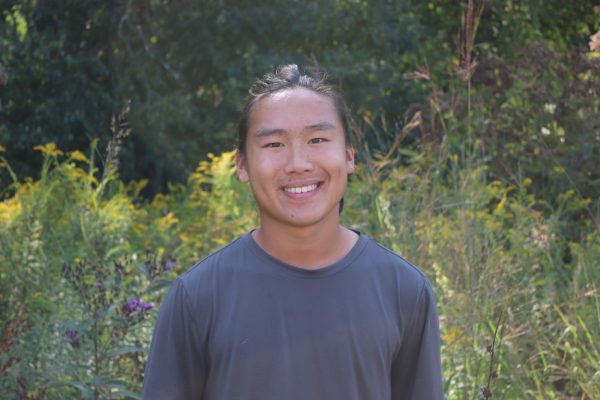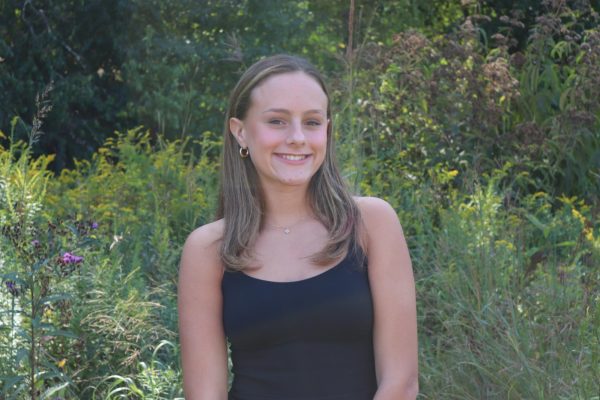In response to the antisemitic vandalism plastered across the Wayland Community Pool on March 5, the Wayland community is working to battle antisemitism and hate.
The swastika that was graffitied on the Wayland Community Pool is a symbol of universal hate, but is more often associated with antisemitism. While Wayland has seen antisemitic acts in the past, there have also been efforts to fight this type of hate. In fact, Holocaust speaker Dan Ottenheimer regularly visits to share the stories of his father’s experiences as a German Jew during the Holocaust.
In spring of 2024, Dan Ottenheimer was able to speak to the Wayland High School Class of 2025 and Class of 2027 — both of which were studying the Holocaust at the time — thanks to Social Studies Department Head David Schmirer. This year, Ottenheimer spoke again to the freshman and junior class in an assembly on Thursday, May 8. In the future, Schmirer plans to host speakers who have faced any variety of other forms of hate at WHS.
“The most important piece is that we are rapidly losing people who lived through and survived the Holocaust, and I think those stories being told are essential,” Schmirer said.
Schmirer elaborated that telling these stories is an important way to pass down information and ensure that important pieces of knowledge are not forgotten.
“If you look at the factors that helped to bring about the Holocaust, a lot of those same pieces are bubbling up not only in our own country but around the world right now,” Schmirer said. “If we use history for anything, it’s helping us not just to explain the past but also to try to create a better future.”
In the past, Wayland hosted guest speaker Kati Preston. Preston is a Holocaust survivor who suffered through its horrors at the age of five and has since shared her story across New England by speaking to audiences in person and through her graphic novel “Hidden: A True Story of the Holocaust.”
Wayland is home to its own group of teachers, Diversity Equity Belonging Lead Teachers (DEBLT), that are responsible for ensuring a safe and diverse space for all students to learn and feel comfortable. These teachers lead conversations within the staff of Wayland schools to discuss how best to talk to students about topics regarding acceptance and belonging.
“I think that our biggest question is around how we increase students’ feelings of belonging in our community and foster awareness of issues related to various groups,” DEBLT member and Department Head of World Languages Alaina Ghetti said.
The DEBLT group is headed by Wayland Public Schools Director of Diversity, Equity and Belonging Caroline Han. DEBLT spans across all five public schools in the town and consists of representatives from each school. DEBLT meets during advisory councils to discuss how topics of diversity will be scaled depending on the needs of the school in question.
Some teachers also take time to try to give groups a voice such as English teacher Gwen Goldin. Goldin has a routine where every heritage month she shares poetry on Fridays to celebrate those who come from different backgrounds. According to Goldin, poetry is a form of literature that is under-represented in the WHS curriculum and can provide rich and deep insight into culture and history.
“Poetry is a fabulous expression of ideas and feelings,” Goldin said.
According to Goldin, in April, which celebrates Arab American Heritage month, one of the poets her students enjoyed most was Naomi Shihab Nye, an Arab American poet who uses experiences from her cultural background in her poetry. Goldin also lists Aimee Nezhukumatathil as a popular poet for the month of May, which celebrates Asian American and Pacific Islander heritage.
Wayland is also a home to the METCO program. This program is responsible for bringing students from Boston into suburbs with more educational resources as well as help break down racial barriers between communities.
“The town of Wayland was in the second wave of METCO towns,” METCO Academic Liaison Mark Liddell said. “We started the METCO program here in 1968 with the purpose of bringing students from Boston into a situation where they’ve got more access to better resources.”
While the program did serve the purpose of bringing in Boston students to Wayland, it was also introduced because of the desire to expand diversity within the student body of Massachusetts schools.
“At the same time there was a push from Wayland and towns like it to bring in students from Boston to diversify the student population here which was largely, at that time in the 1960s, white,” Liddell said. “There was this desire to diversify the population because there was an understanding that in doing so, the children who were here in public schools would better understand the world around them and the people who inhabit it.”
While METCO does bring in students from Boston into the suburbs, according to Liddell, the cultural side of the exchange is not entirely two-sided. Liddell explains that METCO students sometimes change a part of who they are to match the suburban environment.
“The students who come from Boston are coming here to gain access to the resources, but in many ways they code switch or put on a facade of sorts that will then afford them opportunities, “ Liddell said. “They have to relinquish part of themselves in order to gain some success.”
Part of Liddell’s role as Academic Liaison is to provide support for METCO students in whatever they need, including college, help outside their time at WHS and any troubles they have while in WHS. They can also reach out to any of the METCO staff for any support that they may need.
While Wayland is home to many more organizations that create community and combat hate, such as the Gender Sexuality Alliance or the religious groups within the high school, the community still has a long road in the battle against hate.
“If we want to be people who come together and unite and understand each other better, the way that you do that is by encouraging diversity in the teachings that you do at school and the jobs that people have access to,” Schmirer said.





























